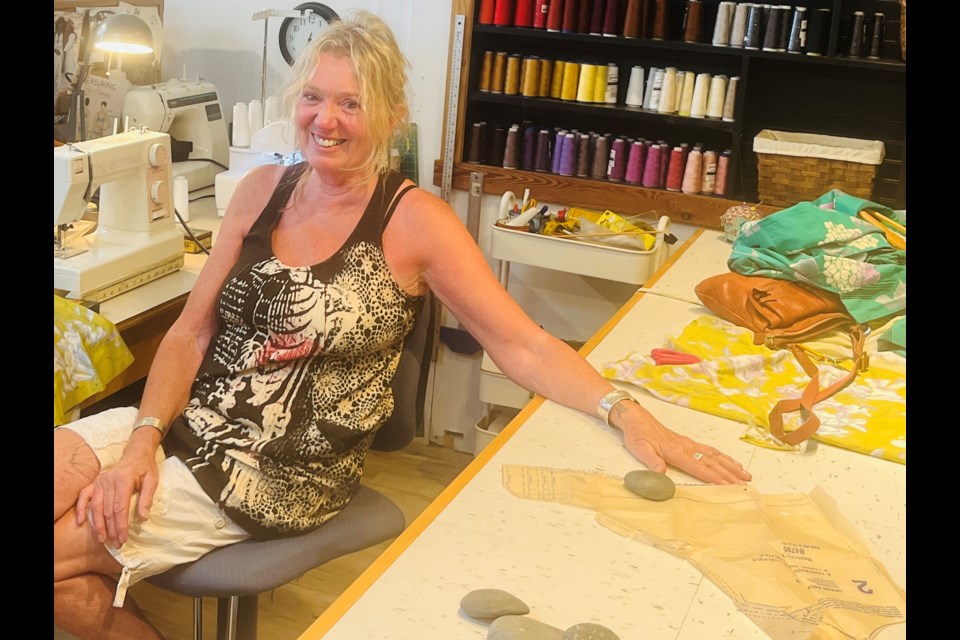Slow fashion studio collective Eunoia was located inside Townsite Public Market for more than five years. Founders Shaunie Yates and Diana Roxburgh decided to migrate to Marine Avenue in Westview and rebrand as Original Rebels artisan clothing collective this past spring.
"It feels good; the energy is really good," said Yates. "I like interacting with people, because part of what we're doing here is educational."
Yates said before opening Eunoia, the qathet-based business partners started out hosting a wearable art fashion show. Now, once again, they are organizing another wearable fashion show for next year at Dwight Hall in Townsite, as part of the ReNew Art Faire.
"We are rebelling against fast fashion, and the disaster that it caused and is continuing to cause globally," said Yates. "When everything went offshore there was quite a collapse of the textile clothing market in Montreal and Winnipeg, places like that."
Although fast fashion is a fairly recent name given to cheap clothing made overseas, the trend started in the 1970s. It didn't gain prominence in Canada until the 1990s, with the rise of global fast fashion brands like Zara and H&M.
"So everything goes offshore, gets really cheap and loses its value here in terms of mending or repairing anything, "explained Yates.
Skills such as sewing and learning how to fix things now seem like a forgotten art, according to Yates, but younger folks are taking an interest in slow fashion and the do-it-yourself (DIY) movement.
"There's been a real upsurge in thrift stores, which I like, because ultimately it all helps with the waste stream by reducing waste," said Yates. "I feel committed to this [slow fashion] politically in a way."
Celebrating natural fibres, repurposing materials and creating garments out of vintage tablecloths is what the collective is all about. Yates makes repurposed garments from fabrics such as linen, silk and cotton she finds in thrift shops.
"It's so much fun, I just love it," said Yates. "Everything ends up being one-of-a-kind because you were using, for the most part, things that already exist."
Currently, Yates is turning tablecloths and vintage linens into dresses. The shop is filled with pants, dresses, skirts, jackets and shirts made with lighter fabrics to complement the summer season. But soon, she will start making warmer jackets for fall and winter.
"In the winter, I do a lot of coats out of 100-per-cent wool blankets," said Yates. "I've been a thrifter for years, but now sometimes people bring us things."
Roxburgh hand paints silk scarves, shirts and skirts, using upcycled materials and natural dyes.
"She likes to hand paint and when she finds a really good quality men's shirt, really nice cotton, then she'll paint on them or applique," said Yates. "It's kind of cool, because lots of times there's nothing for men in these shops."
Yates said they are both committed to using natural fibres, not only because they are more environmentally friendly, but because they feel good and are more comfortable.
Yates recently made someone a wedding dress out of vintage wedding dresses with handmade silk.
"I started making doll clothes when I was just a kid," said Yates. "I've always sewn and made my own clothes. I've been a weaver, and I still am a weaver as well."
Yates said she became aware of the harms of the fast fashion industry decades ago, and the impact it was having, but no one was talking about it back then.
"You didn't hear the word organic 20 or 30 years ago,” said Yates. “You didn't hear the word local, you didn't hear natural fibers. In the end, when all is said and done, [natural fibres] will compost, and they actually behave so differently than anything that has a polyester."
She explained that wool, organic cotton and linen drape better over the body and keep a person warm, dry or cool.
"This whole process, it's good for your creative soul, good for the planet," said Yates. "It's good for the people at both ends of the stream."
Join the Peak’s email list for the top headlines right in your inbox Monday to Friday.




